The Legend of Li Lu
Origins of a legendary investor
We kid about Li Lu, if you said that someone was going to make a billion dollars and be the head of the largest country in the world, all in one lifetime, he could be the guy.
- Tom Bernstein
Wanna watch this post instead? Check it out on YouTube:
Li Lu might just be the most interesting investor to ever live.
Bold claim! But hear me out…
Born during the Cultural Revolution where his parents got sent off to labour camps so he bounced around peasant families that could take him in.
Survived the great Tangshan earthquake whilst all of his foster family perished.
He not only participates but helps lead the Tiananmen Square protests of 1989 where he ends up on China’s most-wanted list.
Flees China and ends up in the US where he becomes a world-class value investor and best buds with Charlie Munger in the process.
Sound interesting? Let’s dive in deeper
Early Life and the Cultural Revolution
Li Lu’s story begins in April 1966 when he was born in the coastal, industrial city of Tangshan, in northeastern China. His father was a Soviet educated engineer and his mother was a botanist and the daughter of a rich landlord.
Only one month later, Mao Zedong would begin China’s Cultural Revolution. The aim of which was to preserve Chinese communism by purging remnants of capitalist and traditional elements from Chinese society, and to re-impose Mao Zedong Thought (AKA Maoism) as the dominant ideology in the PRC.
Due to his parents being intellectuals, they were denounced as class enemies and both were sent off to labour camps. Li’s mother first being sent away to a labour camp not long after he was born and then his father later on was listening to a foreign broadcast on the radio and someone overheard, accusing his father of being a foreign spy. So he was sent away to a coal mine as well in order to be “re-educated”.
Luckily, Li’s parents had been able to pay various other families to take him in while they had been forced away. One of his father’s friends, an illiterate coal miner known as “Da Pa” agreed to take Li in, and had a huge positive impact on his life.
Da Pa sadly died in a mine explosion when Li was around seven or eight, leaving Da Ma alone to raise 6 kids, with Da Ma’s son Lao Da even having to take his father’s job in the coal mine aged only 15 to make ends meet. But eventually, Li Lu’s parents were “rehabilitated”, and he was allowed back to stay with them, even if he felt awkward with his parents and they felt like strangers to him.
But whilst things were far from perfect, they were still about to get a whole lot worse.
Tangshan
Having survived the Cultural Revolution, and only a few months before Mao Zedong would eventually die, one of the deadliest earthquakes ever struck Tangshan. In the early morning just before 4 am, the magnitude 7.6 quake struck the city, with initial damage and hysteria being so bad that Li recounts in his book that people were screaming that the USA had dropped an atomic bomb on the city.
Li had luckily stayed at his parent’s flat on the night of the earthquake, along with his brother and aunt, all who luckily survived. But his foster family who he was so fond of, Da Ma and the kids, were not so lucky. Li ran to their house to find and help but all he found was the house caved in. Little Six was barely alive, begging Li for help, but eventually died. Only Lao Da, Da Ma’s eldest son survived from that family but even then, the whole lower half of his body was crushed.
In total, the Tangshan earthquake is estimated as the third deadliest in history with over 242,000 deaths. But the earthquake and its aftermath also caused the start of Li Lu’s distrust and aversion to the government, a key moment that would snowball.
The soldiers and party officials are grabbing all the things available for relief for themselves or their family, Older people just don’t get anything. So I developed a tremendous aversion, you know, hatred toward those people.
By this time Li was almost nine years old, had lived with 9 different families, lived through the Cultural Revolution and had survived the great Tangshan earthquake. Yet his unreal story was only in its infancy.
Tiananmen Square and Escape
By 1985, Li had completed his high school education and decided to attend Nanjing University to study semiconductor physics before later transferring to Economics. Nanjing is the capital of China’s eastern Jiangsu province, about 1,000km from the capital Beijing.
In 1985 at Nanjing University, Li Lu was actually a member of the Chinese Communist Party would ya believe! He hated the religious-seeming worship of the Party but still believed that in China it was essential to try to reform the Communist Party from within. Unsurprisingly, he was quickly disillusioned and dropped out, though still wondering how reform may be possible.
A few years later on April 15 1989, Hu Yaobang died. Hu was an advocate for political reform and was a young man on the Long March with Mao Zedong and Deng Xiaoping. In 1987, he had defended the student’s demands for reform and had been expelled from his post as general secretary of the Chinese Communist Party.
His death sparked an outpouring of support across the country. At Nanjing University, posters appeared for Hu, praising his efforts and the good he had done in his life. But by the next day, the slogans and posters were changing from memorials to Hu into criticism of the current state of affairs: the crises in education and the economy, the lack of morality, the rampant corruption of officials, resistance of the leaders to political reforms, Deng Xiaoping’s autocracy, and the suppression of freedom in the media.
Very quickly, and unsurprisingly because of its location in the capital, Tiananmen Square in Beijing became THE place to be to protest for change. But it wasn’t so simple for Li to initially attend and join the movement, because Li was 1,000km away in Nanjing.
Li Lu hopped on a train (without buying a ticket) and arrived in Beijing with nothing but underwear in his pocket on the 27th of April. It was only a day after the April 26 Editorial which was a key turning point because the CCP effectively branded the student movement as an anti-party, anti-government revolt. This enraged the students and made it a major sticking point for the remainder of the protests.
People were sceptical of Li Lu given he was from Nanjing, and also because he had no documents on him at the time, even though it was common for students participating at the time to avoid repercussions. Luckily, Chai Ling, described as a spiritual leader of the protest, trusted Li Lu and stuck up for him often when people attacked his character and credentials.
At one point during the protest his girlfriend from Nanjing, Zhao Ming, surprised him in Tiananmen Square, so they decided in the spur of the moment to get married.
As the protest went on, things deteriorated and the tanks stormed Tiananmen, Li went into hiding, and with the aid of people smugglers of all people, was smuggled out in a boat to Hong Kong, and then onwards to France. Li was assisted by Operation Yellowbird, a Hong Kong-based operation to help those students who participated in the protests a chance to escape overseas. Overall Operation Yellowbird helped over 400 dissidents by smuggling them through Hong Kong and onwards to Western Countries by applying for visas on their behalf.
But why did Li Lu escape to France originally and not the US? People in Hong Kong had been applying on behalf of Li and other dissidents for political asylum. The United States was asked originally but came back with that they would not take political refugees from Tiananmen Square. And France was the only country that would take them at that time.
Eventually, Li made his way to America and luckily had a place to stay thanks to Mary Daly who he speaks so fondly of:
When I first escaped from Tiananmen Square, and everybody was asking me all these deep, philosophical questions like, “What’s the democratic prospect in China.” Mary patiently waited for everyone to quiet down then asked me: “Do you have a place to stay? Do you have any other clothes you can change into?” And of course the answer to both questions was “No.” So basically, for my first six months in America, I literally stayed in Mary’s living room, and she was sharing a townhouse with twelve other individuals, with a common living room.
Li Lu on first arriving to America and on Mary Daly helping him out.
So Li Lu has a place to stay, but what to do now? Even though Li had previously studied for about three and a half years at Nanjing University, unsurprisingly, he couldn’t get a hold of his old transcripts. So it was back to square one in terms of studying.
And this is where Li’s grandfather comes back into the picture: So his grandfather, Zhu Qi Xan, had previously received his PhD from Columbia. And whilst Li Lu had never met him since he died when Li was just a year old, he didn't even know he had grandparents until he was about 12, he was a massive influence on him. This quote from Li sums it up well (source):
I never met my grandfather, he died in prison when I was just a year old (During the Cultural Revolution). But he left behind lots of unpublished manuscripts and I read them over and over. He was always a hero in my mind as I grew up. That's partly why I chose to come to Columbia. My family has a heritage here. But that heritage is larger than that. It includes a heritage of certain ideals and principles. I feel that my grandfather got them from Columbia, and I have received them from both my grandfather and Columbia.
Over the summer Li enrolled in the American Language Program at Columbia so he could learn English. From 8am until 8pm every day over the summer he had his English class. In the fall he was later placed in the School of General Studies where he started his studies all over again.
New York was totally alien to me. I had never seen or experienced anything like it. The whole experience was quite overwhelming. There are all sorts of freedoms here, but in a way that heightened my sense of guilt. When I first arrived I hardly spoke any English, and that increased my sense of loneliness and isolation. I was lucky to meet Mary [Daly] and, through her, Trudie [Styler]. I think Trudie came round to the house one day and I was introduced to her, but I had no idea who she was or what she did. I met Sting later and I had never heard of him. I just thought that they were both very nice and kind.
So through Mary Daly, he met Trudie Styler, who at that time was an actress in her own right, but also married to a musician you have heard of called Sting. He has a few decent songs. But Styler became a key role in Li’s life, initially giving him a big bag full of Sting’s clothes when he first arrived, helping Li write his book and visit the publisher in London, then later on buying the film rights to Li Lu’s book and creating the Moving the Mountain Documentary.
There was never a question in my mind that she should make the documentary of my book. I trust her completely.
I place great value on the friends I have made in the West. Trudie will be my friend until the day I die, of that I am certain.
With royalties from the book, as well as fees earned from giving lectures, he made investments and rode the bull market to the $125,000 he needed to pay his living costs and the tuition not covered by his scholarship.
With friends like Mary Daly and Trudie, they would later help drive the next chapter of Li’s life, becoming a legendary investor.
Investing & Life Now
So while Li Lu would eventually grow into a formidable investor in his own right, the beginnings of which involve a good deal of luck and humour. Li in his own words1:
I always had this fear in the back of my mind of how I was going to make a living here. I didn’t even think about success at the time – I just wanted to pay my bills. I grew up in Communist China and never had much money to my name, and then all of a sudden I had giant student loans. So naturally I tried to make a buck or two. One day, about two years after I arrived, a friend of mine who knew my issues said, “If you really want to make money you have to listen to this fellow. He truly knows how to make money.” I wasn’t sure what it was all about. I just remember thinking that there was a “buffet” involved. So I assumed that it was some kind of talk with a free lunch! I said it was a good combination – a free lunch plus a talk about how to make money. So I went. To my dismay there was no lunch. There was just a guy with the name “Buffett.”
But the ideals of Value investing really struck a chord with Li Lu:
Mr. Buffett really made a lot of sense during that talk. It was like a punch in my eyes. It was like I had just woken up and a light had switched on.
At the time, I couldn’t really start companies, and I didn’t want to work in a big company because of the differences in language and culture. Investing, on the other hand, sounded like it required a lot of reading and mathematics, hard work, and good judgment – I was confident that I could do those things well. And the fundamental principles of value investing appealed to me – buy good securities at a bargain price. If you’re wrong, you won’t lose a lot, but if you’re right you’re going to make a lot. It fit my personality and temperament very well.
When it came time to make some bread out of college, Li worked a summer at the white-shoe law firm Simpson, Thacher & Bartlett, put in four months at the media investment-banking firm Allen & Company and then spent two years as a corporate finance associate at another investment banking firm, Donaldson, Lufkin & Jenrette. But the work that went with pleasing clients didn’t sit well with him.
“It’s very hard for me in the service business, I want to make up a decision and do it. I’m a doer rather than just giving ideas.”
Li Lu’s saviour from the service side came in the form of Rena Shulsky, a Manhattan real estate magnate whom he had met while giving a lecture. It was a red-eye flight from San Francisco to New York in 1997 and she encouraged him to start a fund. “I thought he could do better than working at D.L.J” she said. And not just advice, she also gave him $2 million in seed money to get him started!
That conversation and $2m of capital was the launching pad for starting Himalaya Partners. First as a hedge fund, and then adding a venture fund later on. Investors in his fund included Bob Bernstein (who was the Random House Chairman and originally helped Li gain asylum in the United States in his role as board president of the Lawyers Committee for Human Rights), Sting, and Jerome Kohlberg the founder of KKR just to name a few. Pretty average lineup of investors hey /s
His first year going at it alone was not a good one. It was 1998 and his fund, which was invested chiefly in Asian stocks, was hammered by the Asian debt crisis, and lost 19%.
“I felt bad that people had trusted me, All they knew was I was a student activist and all they saw was losses.”
In 2002, Julian Robertson (the founder of Tiger Management) gave him money to manage:
“When I ran my own fund, early one in my career Julian Robertson, the founder of Tiger Fund invited me to share an office with him. He invited lots of fund managers that he invested money in to work together and share ideas.” - Source
but the relationship would eventually fall apart because Robertson insisted Li short, which Li wasn’t too fond of. “Shorting was one of the worst mistakes I’ve made.”
But Li Lu was a natural fit for value investing and going long-only given his temperament and thought process, and he explains why he loved investing so much:
“You prove to them you’re good, people trust you. They don’t ask how many years I’ve managed a fund. The question is, Can you make me money? Show me the money! This is one area where, if you really believe you’re smart and you’re unique and you’re different, this can be challenging-this is it. Because if you’re right, you make a lot. If you’re wrong, you lose a bundle.”
So having already come into contact, albeit briefly, with Warren Buffett at the start of his investment journey, he would eventually forge a strong relationship with the oracle’s right-hand man Charlie Munger. Li Lu first met Munger through his human rights contact Jane Olson, wife of Ron Olson, a Berkshire Director and early partner at Munger, Tones & Olson in 2003.
Munger and Li quickly bonded over a suspicion of finance companies' reported earnings They "don’t like the bullshit"
I’ve read Barron’s for 50 years. In 50 years I found one investment opportunity in Barron’s, out of which I made about $80 million. For almost no risk. I took the $80 million and gave it to Li Lu, who turned it into $400 million or $500 million. So I have made $400 million or $500 million out of reading Barron’s for 50 years and following one idea…I didn’t have a lot of ideas. I didn’t find them that easily, but I did pounce on one.
- Charlie Munger, 2017 Daily Journal Shareholder Meeting
Munger’s thoughts on Li Lu are incredibly complimentary, but I think his actions say more than his words. Because as far as I understand, Li is the sole outsider in Charlie’s life who he has invested with. Munger in his interview alongside Li Lu for Weekly Stocks said that the Mungers basically have three investments, Berkshire Stock, Costco and the investment in Li Lu’s partnership.
No mean feat having one of the greatest investors of all time choosing your fund as one of only 3 investments!
Return to China
After everything, would you believe Li Lu has been back to China?
Apparently, Li is able to travel within China nowadays albeit on a limited basis. But is hoping to regain his full travel privileges in the future.
But how does one of the student leaders and one of the most influential during the most violent and famous protests in China, end up doing so much business with them and be accepted back? Money? Silence? Especially with the CCP being so strict and sensitive on these types of issues. He’s been allowed to give a lecture at Peking University, and apparently has guided Bill Gates and Warren Buffett around BYD, but this blog article is the only insight into the situation that I could find:
As Buffet and Gates toured BYD in Shenzhen, Li Lu was among them.
A reporter for Hong Kong newspaper Ming Daily describes the scene as highly controlled. Reporters are allowed to photograph Buffet but not his entourage. But Li Lu could still be spotted. The newspaper said that Li Lu entered China with an American passport with special permission by the Chinese authority.
This is the very first confirmed case that one of the 21 Most Wanted student leaders who have escaped abroad is allowed to visit his home country.
The truth of the matter and reasoning for why Li Lu has been allowed to return on trips is not quite knowable. I don’t think it’s controversial to say things have gotten worse in terms of individual freedoms and liberties since Tiananmen. Wu’er Kaixi, another dissident who participated in 1989 highlights what life is like for those that participated:
Wu’er Kaixi characterized exile as a form of "mental torture," saying that he was prepared to face the consequences of returning to Beijing, including jail time, if it meant he would be able to see his parents again. (They are prohibited from traveling abroad.) Instead he lives in a neo-authoritarian netherland, full of desire to go home to the country seeking his arrest but which also refuses to arrest him.
Wu’er Kaixi has tried repeatedly to go home. Chinese authorities have turned him away each time: in Macau in 2009, the Chinese embassy in Tokyo in 2010, and the Chinese embassy in Washington, D.C. in 2012.
It’s unknown how the CCP truly views Li and their reasons for allowing him to travel back to China (even if it is limited). And it’s unknown how Li views the CCP back. Can he visit his parents assuming they’re still around? Li also has a brother that’s barely ever mentioned, can he see him? All these questions and I doubt it’s something we will ever know. But it’s worth wondering about.
So what does Li Lu think of those that accuse him of abandoning his cause?
I need a profession, because I think you can't be just a professional dissident.
In a 1996 New Yorker article2, James Traub writes “He [Li Lu] explains that he has "a long-term strategy" to mobilize the overseas Chinese whose investment has been fueling China's growth. He regards himself as an improbable survivor and a tribune for those who suffered at Tiananmen Square.” before Li Lu himself later says:
If I ever lost that sight, that would be the moment my life kind of ended--because at that moment I would have lost my sense of morality.
Either way, Li Lu has my favourite background of any investor, and possibly any individual. I quoted it at the beginning of this post, but it deserves repeating:
We kid about Li Lu, if you said that someone was going to make a billion dollars and be the head of the largest country in the world, all in one lifetime, he could be the guy
But, I want to finish with a Li Lu quote from his reflections on reaching 50, and I think it sums up the great man and gives some great advice:
Woody Allen is right, 90% of success is to show up. At various stages in my life, I could have stopped, or took the long rest. For some reason, my heart told me otherwise. I just kept going. Half of the time, I wasn’t sure where I was heading. The other half I was probably taking the wrong turns. No matter.
You can find previous posts here. I also interview legends at Compounding Curiosity and shitpost on Twitter @scarrottkalani.
Want to get in contact? Reply to this email, comment on Substack, or send a letter via carrier pigeon and trust that fate will deliver it.
Enjoyed this? Chuck a “❤️” on Substack or share it with a mate
Graham & Doddsville Spring 2013 issue



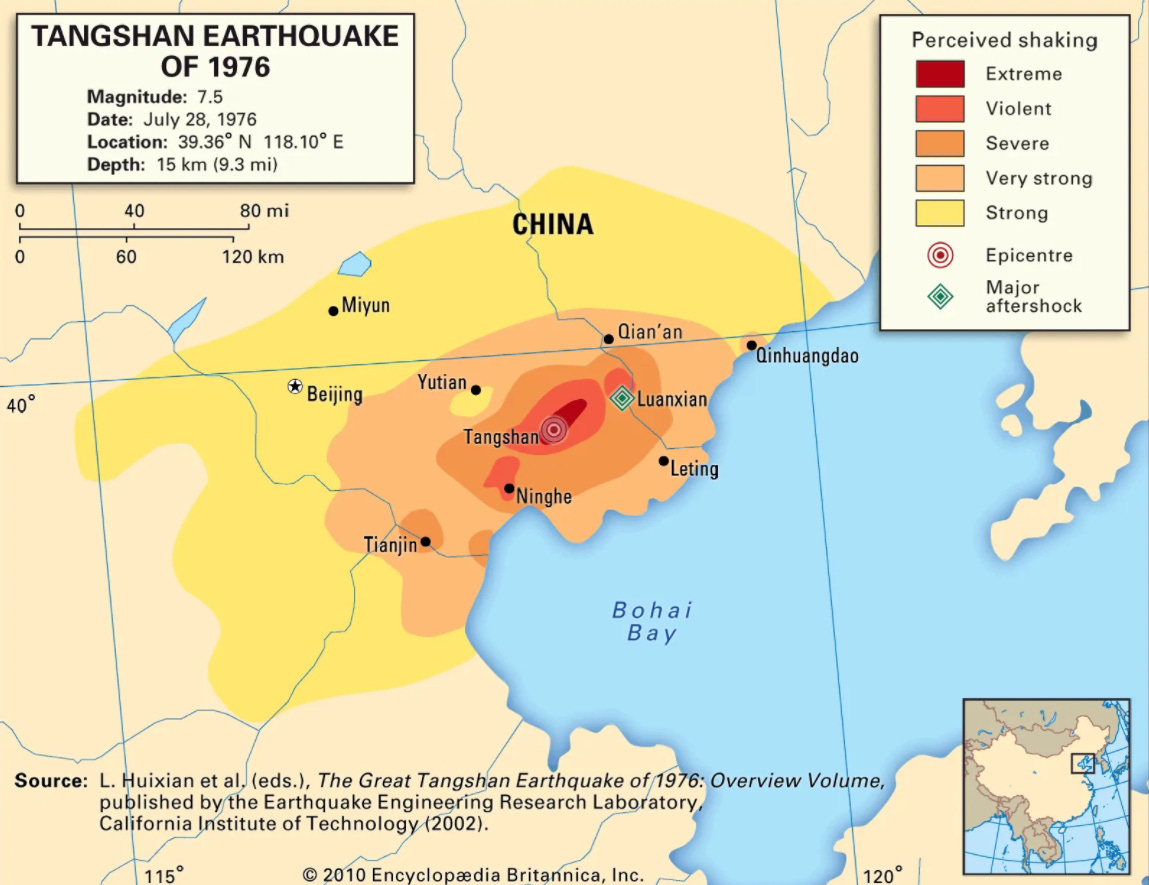
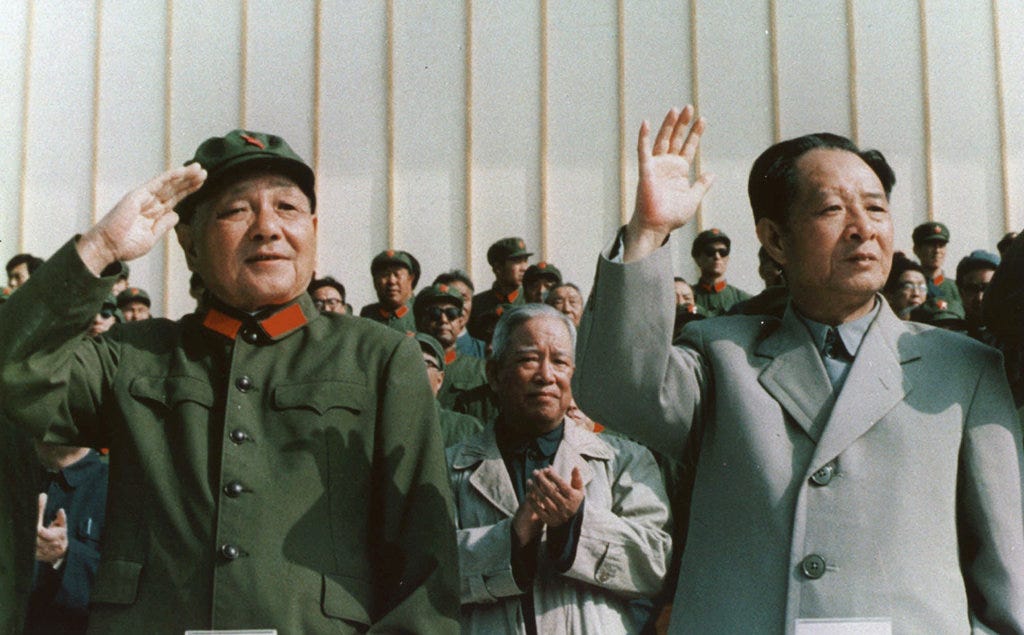




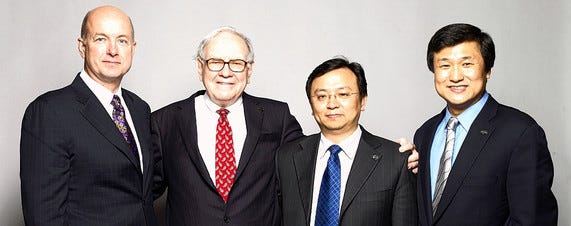


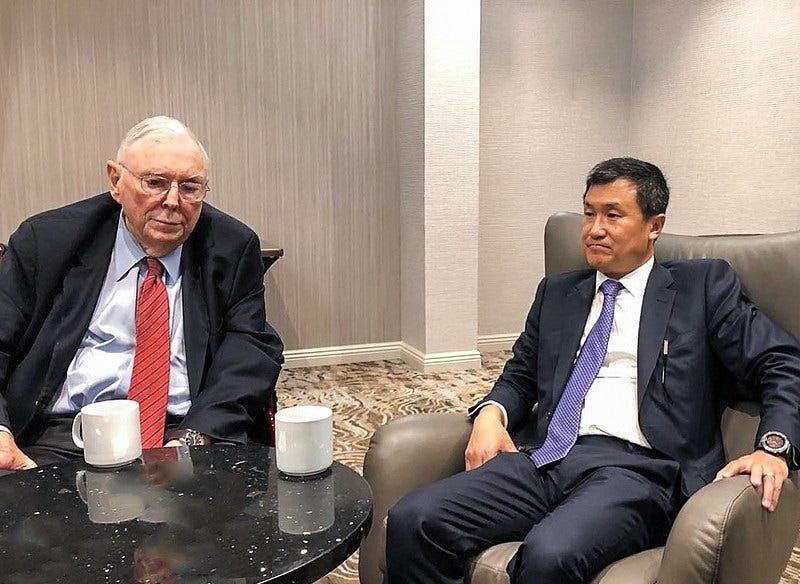




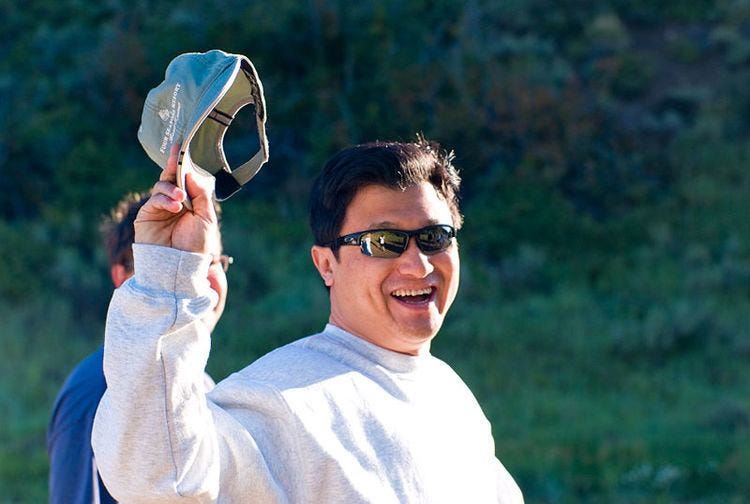
Amazing profile, well done!
Hi Kalani, a follow up question: What's the source of Li's encounter with Rena Shulsky? I can't find anywhere this is mentioned.